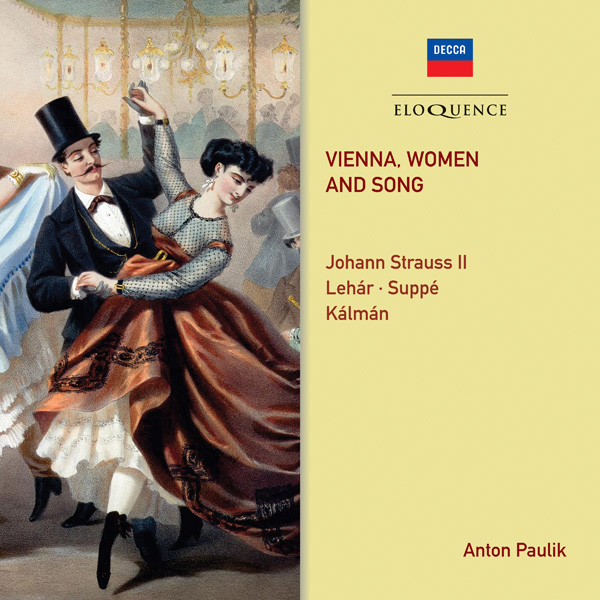A feast of Viennese operetta on two Decca albums, newly remastered and reissued complete.
Born in Bratislava – Pressburg, as it was in 1901 – Anton Paulik became a reassuring presence for decades. In the pit at the ‘lighter’ Viennese lyric theatres, he could make the music of the ‘Waltz King’ and his successors sparkle and swirl like few others. In charge at the Volksoper one night in summer 1969, Paulik was ‘flawless and apparently ageless’ according to the critic for Opera who got to the heart of the conductor’s gifts: he ‘knows how to play operettas so that they were whistled in the streets from the premiere onwards and he knows how to make them sound respectable at the same time. In this respect, he is comparable only with the Clemens Krauss of the famous ‘Fledermaus’ recording’ (also reissued by Eloquence, 482 7379).
In 1958, Paulik and the Volksoper had recorded an album of excerpts from Emmerich Kálmán’s best-known operetta, Grafin Märitza. This was done under studio conditions at the city’s Sofiensaal but thoroughly ‘run in’ after performances of a new production at the Volksoper. Paulik’s presence on the podium was a guarantor of authenticity: he had led the premiere back in 1926 at the Theater an der Wien. Marcel Prawy who was close to Kálmán during the composer’s last years, produced the recording for RCA (it first appeared on Decca in 1973). To get them in the proper mood, Prawy took the entire cast to the nearby Hungarian border at Lake Neusiedel. While searching for a genuine gypsy band, Prawy and Paulik went to Vienna’s Pataky Restaurant where a new group had recently made its début. They signed the band on the spot, loaded the gypsies into two taxis, went to the Sofiensaal and began to rehearse.
In December 1970, Paulik and the Volksoper returned to the Sofiensaal, this time for Decca, to record a double-LP of Viennese operetta which was duly released the following year as ‘Vienna, Women and Song’. The set amounts to a history of the genre, as historically valuable as it is effortlessly enjoyable, opening with a duet from ‘Der Zigeunerbaron’ and closing with a standalone song by Willy Czernik (1901-99), ‘Chi sa?’ Between them, they feature hit numbers from perennial favourites such as Millocker’s ‘Das Bettelstudent’, Suppe’s ‘Boccaccio’, gems of Lehar from ‘Die lustige Witwe’, ‘Das Land des Lächelns’, ‘Paganini’ and several others, before bringing the operatta story up to date with Kálmán, Künneke and names now less familiar to us such as Rudolf Kattnig (‘Mädels vom Rhein’) and Nico Dostal (‘Die ungarische Hochzeit’). With the soprano Renate Holm and tenor Werner Krenn at hand, both stalwarts of the operetta scene in the city, authenticity was once again guaranteed.
CD 1
VIENNA, WOMEN AND SONG
Arias from:
JOHANN STRAUSS II: Der Zigeunerbaron
JOHANN STRAUSS II: Eine Nacht in Venedig
CARL MILLÖCKER: Der Bettelstudent
JOHANN STRAUSS: II Eine Nacht in Venedig
FRANZ VON SUPPÉ: Boccaccio
FRANZ LEHÁR
Die lustige Witwe
Schön ist die Welt
Das Land des Lächelns
Paganini
Der Zarewitsch
Friederike
Der Graf von Luxembourg
CD 2
Arias from:
EMMRICH KÁLMÁN: Die Zirkusprinzessin
NICO DOSTAL: Clivia
EDUARD KÜNNEKE: Der Vetter aus Dingsada
RUDOLP KATTNIG: Bel Ami
NICO DOSTAL: Die ungarische Hochzeit
RUDOLF KATTNIG: Mädels vom Rhein
WILLY CZERNIK: Chi sa?
Renate Holm, soprano
Werner Krenn, tenor
Orchester der Wiener Volksoper
Anton Paulik
EMMERICH KÁLMÁN
Gräfin Mariza (Highlights)*
Marika Németh (Gräfin Mariza)
Monika Dahlberg (Lisa)
Sonja Draksler (Manja)
Peter Minich (Graf Tassilo Endrödy-Wittemburg)
Herbert Prikopa (Baron Kolomán Zsupán)
Wiener Volksopernchor
Wiener Grosstadtkinderchor
Élémer Horváth Gypsy Band
Orchester der Wiener Volksoper
Anton Paulik
*FIRST CD RELEASE ON DECCA
Recording Producers: Christopher Raeburn (Vienna, Women and Song); Marcel Prawy, Christopher Raeburn, John Culshaw (Gräfin Mariza)
Balance Engineers: Gordon Parry, James Lock (Vienna, Women and Song); Gordon Parry, James Brown (Gräfin Mariza)
Recording Location: Sofiensaal, Vienna, Austria, 1–2 November 1958 (Gräfin Mariza), 2–4 & 7–12 December 1970 (Vienna, Women and Song)
Remastering Engineer: Chris Bernauer
First LP Releases: Decca SET 497–98 (Vienna, Women and Song); Decca ECS 2154 (Gräfin Mariza): first released on RCA LM 2406 in November 1960, then on Telefunken in August 1973, repatriating to Decca for release as part of the label’s ‘Eclipse’ series in July 1974

